Sanctions imposed by India
Countries
| Country | Period | Summary |
|---|---|---|
| | 1946–1993 | India was the first country to sanction South Africa for the apartheid. [3] |
| | 1989–1999 | Following deterioration of diplomatic ties India imposed a trade embargo. [4] |
India has historically and largely not supported sanctions imposed by individual countries. [1] [2] The Government of India has largely supported United Nations sanctions. [1] India has also been warned with sanctions, imposed with them, and has also imposed and threatened its own. [1]
| Country | Period | Summary |
|---|---|---|
| | 1946–1993 | India was the first country to sanction South Africa for the apartheid. [3] |
| | 1989–1999 | Following deterioration of diplomatic ties India imposed a trade embargo. [4] |
| Sanctioning Country/Entity (s) | Period | Summary | |
|---|---|---|---|
| | 1974 | Following 1974 nuclear tests Canada sanctioned nuclear expertise and equipment support. [5] | |
| Multiple countries | | 1998–1999 | United States imposed sanctions as required by law following 1998 nuclear tests. [6] Sanctions imposed by the United States were weakened through exceptions and lifted within a year. [7] |
| | 1998–2001 | Sanctions including the stoppage of loan aid. [8] [9] [10] | |
| ~12 countries | – | Around 14 countries adopted some form of individual sanction or another following the 1998 nuclear tests with marginal effect. [11] [7] Collective sanctions could not gather the required support. [12] | |
| | 1992–2011 | Indian Space Research Organisation was sanctioned for sections of its space program. [13] [14] | |
| | 2019 | Sanctions such as closure of airspace for all Indians following 2019 Balakot airstrike. [15] | |

Nuclear proliferation is the spread of nuclear weapons, fissionable material, and weapons-applicable nuclear technology and information to nations not recognized as "Nuclear Weapon States" by the Treaty on the Non-Proliferation of Nuclear Weapons, commonly known as the Non-Proliferation Treaty or NPT. Proliferation has been opposed by many nations with and without nuclear weapons, as governments fear that more countries with nuclear weapons will increase the possibility of nuclear warfare, de-stabilize international or regional relations, or infringe upon the national sovereignty of nation states.

Pakistan, officially the Islamic Republic of Pakistan, is a country in South Asia. It is the fifth-most populous country, with a population of over 241.5 million, having the second-largest Muslim population as of 2023. Islamabad is the nation's capital, while Karachi is its largest city and financial centre. Pakistan is the 33rd-largest country by area. Bounded by the Arabian Sea on the south, the Gulf of Oman on the southwest, and the Sir Creek on the southeast, it shares land borders with India to the east; Afghanistan to the west; Iran to the southwest; and China to the northeast. It shares a maritime border with Oman in the Gulf of Oman, and is separated from Tajikistan in the northwest by Afghanistan's narrow Wakhan Corridor.
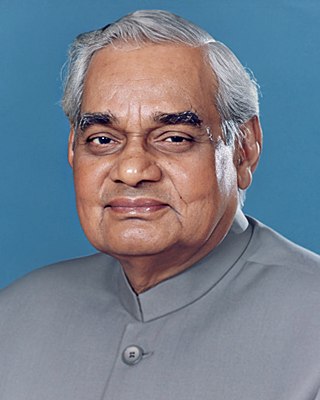
Atal Bihari Vajpayee was an Indian politician and poet who was Prime Minister of India, first for a term of 13 days in 1996, then for a period of 13 months from 1998 to 1999, followed by a full term from 1999 to 2004. He was the first non-Congress prime minister to serve a full term in the office. Vajpayee was one of the co-founders and a senior leader of the Bharatiya Janata Party. He was a member of the RSS, a Hindu nationalist volunteer organisation. He was also a Hindi poet and a writer.
Economic sanctions are commercial and financial penalties applied by states or institutions against states, groups, or individuals. Economic sanctions are a form of coercion that attempts to get an actor to change its behavior through disruption in economic exchange. Sanctions can be intended to compel or deterrence.

India possesses nuclear weapons and previously developed chemical weapons. Although India has not released any official statements about the size of its nuclear arsenal, recent estimates suggest that India has 172 nuclear weapons and has produced enough weapons-grade plutonium for up to 200 nuclear weapons. In 1999, India was estimated to have 800 kilograms (1,800 lb) of separated reactor-grade plutonium, with a total amount of 8,300 kilograms (18,300 lb) of civilian plutonium, enough for approximately 1,000 nuclear weapons. India has conducted nuclear weapons tests in a pair of series namely Pokhran I and Pokhran II.
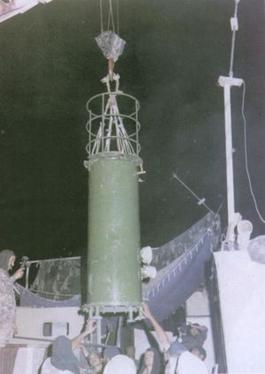
Pokhran-II was a series of five nuclear weapon tests conducted by India in May 1998. The bombs were detonated at the Indian Army's Pokhran Test Range in Rajasthan. It was the second instance of nuclear testing conducted by India, after the first test, code-named Smiling Buddha, was conducted in May 1974.

Krishnaswamy Subrahmanyam was a prominent international strategic affairs analyst, journalist and former Indian civil servant. Considered a proponent of Realpolitik, Subrahmanyam was an influential voice in Indian security affairs for a long time. He was most often referred to as the doyen of India's strategic affairs community, and as the premier ideological champion of India's nuclear deterrent. His son S Jaishankar was appointed India's External Affairs Minister in 2019.
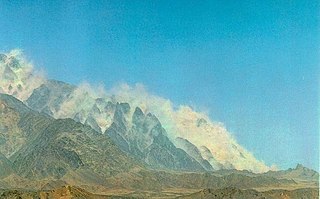
Chagai-I is the code name of five simultaneous underground nuclear tests conducted by Pakistan at 15:15 hrs PKT on 28 May 1998. The tests were performed at Ras Koh Hills in the Chagai District of Balochistan Province.
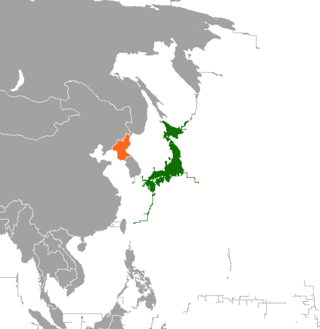
The Japan–North Korea Pyongyang Declaration was signed in 2002, and was the result of a systematic Japan–North Korea summit meeting. The aim of the declaration was to provide low-interest long term loans to North Korea as well as economic assistance, including humanitarian aid, in accordance with the moratorium of nuclear missile development which has been in place since 1999. The Japanese government hoped to learn the fate of Japanese citizens by North Korea which, prior to the declaration, was unacknowledged.
Mohammad Yusuf Shah, commonly known as Syed Salahuddin, is the head of Hizbul Mujahideen, a terrorist organization operating in Kashmir. He also heads the United Jihad Council, a Pakistan-based conglomeration of jihadist militant groups sponsored by the ISI, with the goal of merging Jammu and Kashmir with Pakistan.

Iran and Pakistan established relations on 14 August 1947, the day of the independence of Pakistan, when Iran became the first country to recognize Pakistan. Both sides continue to cooperate economically where possible and have formed alliances in a number of areas of mutual interest, such as fighting the drug trade along their border and combating the insurgency in the Balochistan region.

Relations between India and the United States date back to India's independence movement and have continued well after independence from the United Kingdom in 1947. Currently, India and the United States enjoy close relations and have deepened collaboration on issues such as counterterrorism and countering Chinese influence in the Indo-Pacific.
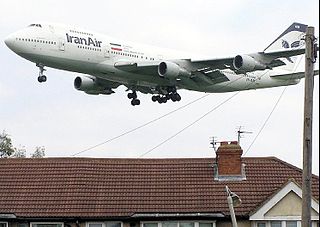
Following the Iranian Revolution, the United States has since 1979 applied various economic, trade, scientific and military sanctions against Iran. United States economic sanctions are administered by the Office of Foreign Assets Control (OFAC), an agency of the United States Department of the Treasury. As of 2017, United States sanctions against Iran include an embargo on dealings with the country by the United States, and a ban on selling aircraft and repair parts to Iranian aviation companies.

The Republic of India recognised Ukraine as a sovereign country in December 1991 following the dissolution of the Soviet Union and established diplomatic relations in January 1992. The Indian Embassy in Kyiv was opened in May 1992 and Ukraine opened its Mission in New Delhi in February 1993. The Consulate General of India in Odesa functioned from 1962 until its closure in March 1999.
There have been a number of international sanctions against Iran imposed by a number of countries, especially the United States, and international entities. Iran was the most sanctioned country in the world until it was surpassed by Russia, following Russia's invasion of neighboring Ukraine in February 2022.

Sartaj Aziz was a Pakistani economist and strategist, who had previously served as the deputy chairman of the Planning Commission of Pakistan, member of the federal cabinet as the de facto Minister for Foreign Affairs, a Federal Senator as well as the National Security Advisor.

The history of the Islamic Republic of Pakistan began on 14 August 1947 when the country came into being in the form of Dominion of Pakistan within the British Commonwealth as the result of Pakistan Movement and the partition of India. While the history of the Pakistani Nation according to the Pakistan government's official chronology started with the Islamic rule over Indian subcontinent by Muhammad bin Qasim which reached its zenith during Mughal Era. In 1947, Pakistan consisted of West Pakistan and East Pakistan. The President of All-India Muslim League and later the Pakistan Muslim League, Muhammad Ali Jinnah became Governor-General while the secretary general of the Muslim League, Liaquat Ali Khan became Prime Minister. The constitution of 1956 made Pakistan an Islamic democratic country.
International sanctions are political and economic decisions that are part of diplomatic efforts by countries, multilateral or regional organizations against states or organizations either to protect national security interests, or to protect international law, and defend against threats to international peace and security. These decisions principally include the temporary imposition on a target of economic, trade, diplomatic, cultural or other restrictions that are lifted when the motivating security concerns no longer apply, or when no new threats have arisen.

Subrahmanyam Jaishankar, better known as S. Jaishankar, is an Indian diplomat and politician, who is serving the thirtieth Minister of External Affairs of the Government of India since 31 May 2019. He is a member of the Bharatiya Janata Party and has been a Member of Parliament in the Rajya Sabha since 5 July 2019. He previously served as the Foreign Secretary from January 2015 to January 2018.

The military relations between Pakistan and the United States have been present since the two established diplomatic relations in 1947. The United States and Pakistan's military have historically close ties and it was once called "America's most allied ally in Asia" by Dwight D. Eisenhower, reflecting shared interests in security and stability in South Asia, Central Asia as well as in regions covering Eastern Europe.
{{cite book}}: |last= has generic name (help)